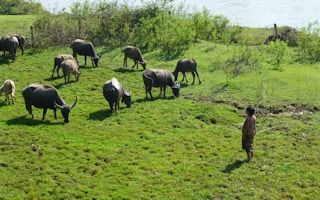Most developing countries that signed the 2015 Paris Agreement on climate change have indicated in their Nationally Determined Contributions (NDCs) that their commitments are conditional on receiving international financial support.
The critical question is, how “ready” are the legal frameworks in developing countries to handle the influx of international climate finance?
The urgency of legal modernisation to support the low-carbon transition is greatest in Asia and the Pacific, where climate change can affect virtually every aspect of people’s lives. Solutions for legal modernisation to improve access to climate finance depend on the unique country context, and need to be tailored to each country.
A legal barrier to climate finance in one country may be as fundamental as its legal system not being aligned with the requirements of the provider/s of climate finance. Another constraint can be discrepancy between the country’s emission targets and the existing legal and regulatory scheme.
For example, a country may have an ambitious emission reduction target but its legal framework may continue to give preferential treatment to grid-based large-scale utility energy generation, or subsidies for fossil fuels. Further legal barriers can include restrictions on foreign ownership, or trade limits for low-carbon technology.
“
The international community, in particular multilateral development banks like ADB, can play a greater role in ensuring that their support to developing countries not only includes general capacity development, but also focuses on identifying and addressing legal barriers to climate finance.
ADB provides technical assistance to help its developing member countries identify legal barriers to accessing climate finance such as those mentioned above, find opportunities for legal reform to address those legal barriers, and recommend ways to address interlinked regulatory, institutional, and administrative impediments to climate finance.
Let’s take a look at two case studies that demonstrate steps to strengthen legal readiness for climate finance in the Lao People’s Democratic Republic (Lao PDR) and Republic of Fiji.
In 2014, the Lao PDR government started preparing a legal framework for climate change adaptation and mitigation. The draft climate change decree clarifies the legal mandates and establishes the reporting lines among relevant ministries and different administrative bodies, which is critical for the future implementation of the decree.
It also identifies the sources of climate finance, and how such funds should be managed. These details will improve transparency and help create the necessary enabling environment for further climate investment.
Recognising the importance of a clear and adequate legal and governance structure to attract more international climate finance, the Government of Fiji supported by ADB, has been undertaking a comprehensive assessment of its legal and regulatory framework and institutional and administrative arrangements. The goals are to identify legal and regulatory barriers, as well as opportunities for reforms.
To identify potential legal gaps, the assessment looks at key laws, regulations, decrees, and orders relevant to climate change mitigation and adaptation across key sectors of the economy. It also includes an in-depth sector analysis for the energy and transport sectors to prioritize legal and regulatory reforms required for Fiji to transition to a low-carbon economy.
Legal readiness for climate finance will become increasingly critical as developing countries start to translate their NDCs into specific actions on the ground.
The international community, in particular multilateral development banks like ADB, can play a greater role in ensuring that their support to developing countries not only includes general capacity development, but also focuses on identifying and addressing legal barriers to climate finance.
Lao PDR and Fiji are taking different approaches to modernise their legal systems. The former is developing an umbrella legal framework to create an enabling environment for climate investment, and the latter identifying legal barriers and developing solutions to address such barriers.
Their efforts can serve as models for other developing countries, since an appropriate legal framework that encourages climate finance flows will be a key factor in ensuring NDC implementation and a zero-emission pathway.
Takako Morita is Senior Counsel, Office of the General Counsel at the Asian Development Bank. This post is republished from the ADB blog.









